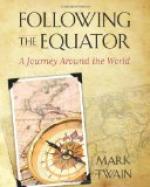November 11. On the road. This train-express goes twenty and one-half miles an hour, schedule time; but it is fast enough, the outlook upon sea and land is so interesting, and the cars so comfortable. They are not English, and not American; they are the Swiss combination of the two. A narrow and railed porch along the side, where a person can walk up and down. A lavatory in each car. This is progress; this is nineteenth-century spirit. In New Zealand, these fast expresses run twice a week. It is well to know this if you want to be a bird and fly through the country at a 20-mile gait; otherwise you may start on one of the five wrong days, and then you will get a train that can’t overtake its own shadow.
By contrast, these pleasant cars call to mind the branch-road cars at Maryborough, Australia, and the passengers’ talk about the branch-road and the hotel.
Somewhere on the road to Maryborough I changed for a while to a smoking-carriage. There were two gentlemen there; both riding backward, one at each end of the compartment. They were acquaintances of each other. I sat down facing the one that sat at the starboard window. He had a good face, and a friendly look, and I judged from his dress that he was a dissenting minister. He was along toward fifty. Of his own motion he struck a match, and shaded it with his hand for me to light my cigar. I take the rest from my diary:
In order to start conversation I asked him something about Maryborough. He said, in a most pleasant—even musical voice, but with quiet and cultured decision:
“It’s a charming town, with a hell of a hotel.”
I was astonished. It seemed so odd to hear a minister swear out loud. He went placidly on:
“It’s the worst hotel in Australia. Well, one may go further, and say in Australasia.”
“Bad beds?”
“No—none at all. Just sand-bags.”
“The pillows, too?”
“Yes, the pillows, too. Just sand. And not a good quality of sand. It packs too hard, and has never been screened. There is too much gravel in it. It is like sleeping on nuts.”
“Isn’t there any good sand?”
“Plenty of it. There is as good bed-sand in this region as the world can furnish. Aerated sand—and loose; but they won’t buy it. They want something that will pack solid, and petrify.”
“How are the rooms?”
“Eight feet square; and a sheet of iced oil-cloth to step on in the morning when you get out of the sand-quarry.”
“As to lights?”
“Coal-oil lamp.”
“A good one?”
“No. It’s the kind that sheds a gloom.”
“I like a lamp that burns all night.”
“This one won’t. You must blow it out early.”
“That is bad. One might want it again in the night. Can’t find it in the dark.”
“There’s no trouble; you can find it by the stench.”




